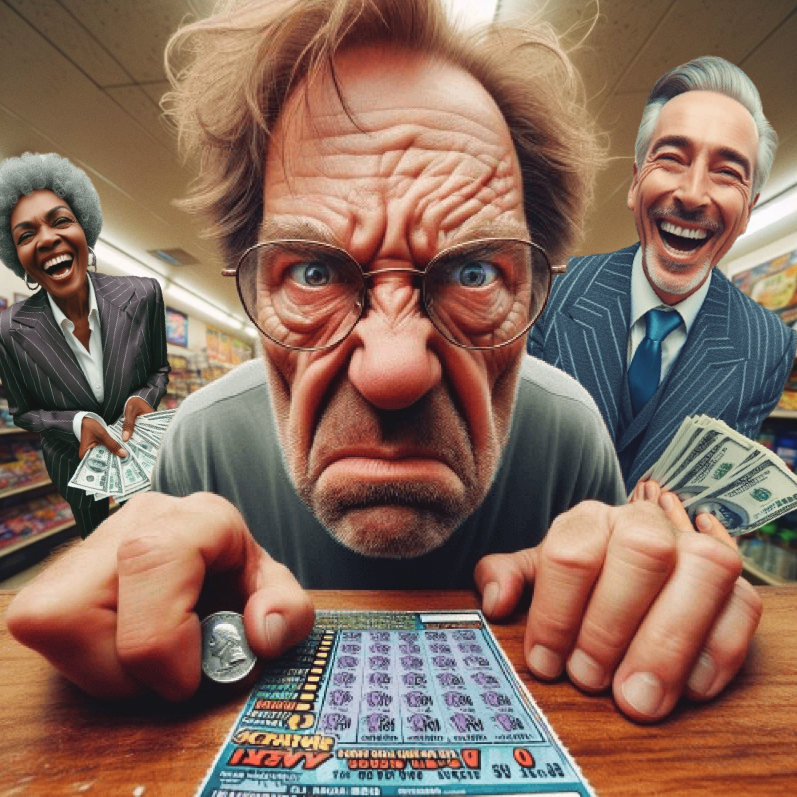
As many of you know, I recently thought the world was coming to an end due to the events of a total solar eclipse. I kinda went a little nuts there, just as everyone does when they feel the end times are near, and maxed out a few credit cards and am now swimming in a substantially deep pool of debt. So far, I’ve tried to combat it with some budgeting, a few more freelance jobs on the side, and I’ve of course turned to everyone’s favorite game of chance: the lottery.
Now, before you start calling me a moron, hear me out. I’ve recently found myself knee-deep in the murky waters of lottery fever, and let me tell you, it’s a wild ride—one that’s left me questioning everything I thought I knew about this so-called “golden ticket” to financial freedom.
It started innocently enough. Like people everywhere, I was facing some tough times as a result of my end times prediction actions and was desperate for a quick fix. As I’d pick up my morning coffee at the gas station, I would buy fifty bucks worth of scratch tickets and a quick pick for the powerball. The very first time I played, I picked up a 7 dollar win on a quick pick, matching 3 of the 6 numbers, just 3 away from a jackpot worth hundreds of millions of dollars. I was hooked.
Armed with nothing but hope and a second mortgage on my house, I dove headfirst into a whirlwind of Powerball, Mega Millions, Keno, and enough scratch tickets to pave a yellow brick road to bankruptcy.
But alas, my dreams of striking it rich were dashed with each losing ticket, leaving me with less money than when I started and a sinking feeling that something fishy was afoot. Call it a gut instinct or just plain old common sense, but I couldn’t shake the feeling that the lottery might just be one big, elaborate scheme—a promise of wealth for the poor, only to line the pockets of the state and leave the rest of us high and dry.
So, why do I think the lottery is more scam than salvation? Well, let me break it down for you:
- Astronomical Odds: Let’s start with the obvious, shall we? The odds of winning the lottery are about as likely as finding a pot of gold at the end of a rainbow—or accidentally catching a fish without a pole while riding a unicycle. Seriously, how can anyone expect to win something that runs on odds worse than your chances of being hit by lightning?
- Algorithmic Selection: Have you ever noticed there are more and more billion dollar jackpots every year? There’s a reason for this, and it’s a pretty dastardly one if you ask me. In recent years, most everything is being run by increasingly sophisticated computer systems, and the lottery is no different. Through algorithms, each drawing can be hand picked to ensure the cheapest payout for the state. As the jackpot gets bigger and bigger, more people play the game and the state gets more money. Somehow, with everyone in America playing at once, the jackpot still manages to grow for three more drawings, pulling in even more players. With more advanced computer systems, the state is laughing all the way to the bank, which by the way, they also control. Suddenly, those billion-dollar jackpots start to seem a little too good to be true, don’t they?
- Siphoning Money: The lottery is often touted as a way to bring much-needed funds to towns and states, but at who is paying this cost? By preying on the hopes and dreams of desperate individuals, the lottery effectively siphons money from its players to benefit the very society they’re trying to escape by playing. It’s a vicious cycle that keeps the poor trapped in a perpetual state of financial struggle. Now before you say, “But Hiram, that’s not very funny, I thought you were supposed to be writing humorous musings and floofy crap like that?”, let me just point out…
- Taxing the Poor: The rich don’t play the lottery. Oh yeah, it gets funnier. I guarantee you that the wealthy are not buying lottery tickets. I mean why would they? They already have their money and they know better than to think that there would be some easy path to wealth. The reality is, the lottery disproportionately targets low-income individuals, effectively serving as a regressive tax on those who can least afford it. If the rich aren’t playing, maybe it’s time we rethink our own participation. But now you say, “But Hiram, you big dope, I still have a chance, and I’m helping the community!” Well that’s some attitude you have on you, because…
- Government Workers Are Helping Themselves: Call me cynical, but isn’t it a little suspicious that so many jackpot winners just happen to be government employees? From police officers to public servants, it seems like the odds of winning the big jackpots are somehow stacked in their favor. We’ve already been through how algorithms can play a role in deciding the winning numbers, so how hard would it be to get those numbers for yourself if you had access to lottery officials? Could it be that the whole system is rigged from the start?

In closing, I urge you to see the lottery for the governmental plot that it is. But hey, if you still want to try your luck, who am I to stand in your way? Just remember: when it comes to the lottery, the odds are never in your favor. And before you say, “Wow Hiram, what kind of bee flew up your bonnet this week?”, just remember I am like $160 grand in the hole now and that you need to come up with more recent colloquialisms.
Hiram Glassman




